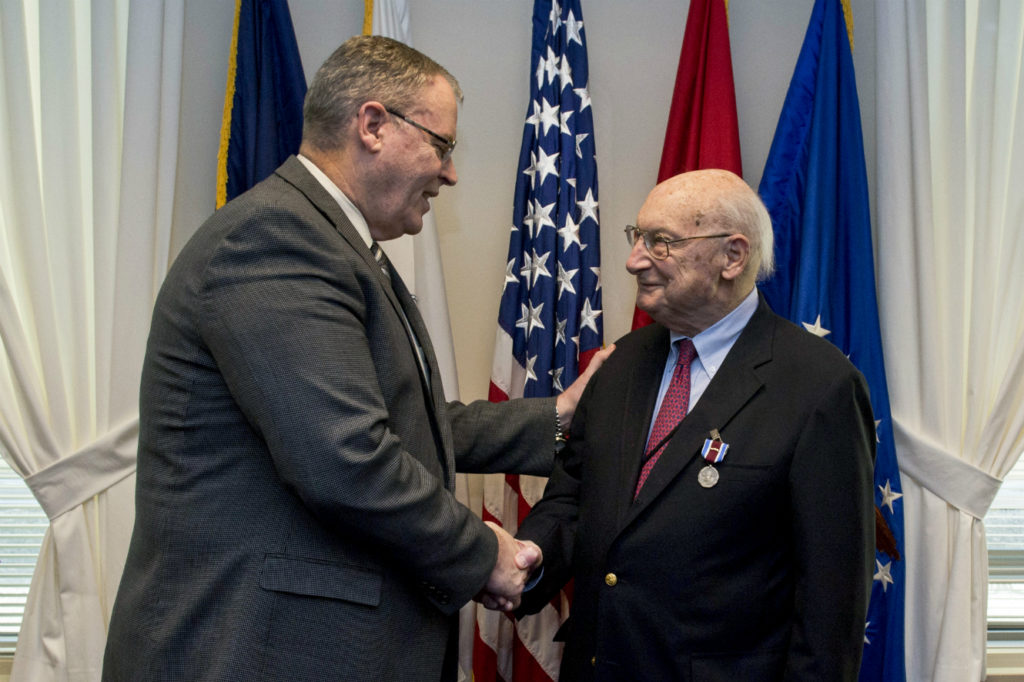Andrew W. Marshall: In Memoriam

The defense community suffered a grave loss on the morning of Tuesday, March 26, with the passing of Andrew W. Marshall at age 97.
Marshall was in many ways the model of a public servant. When he retired, it was not at age 65, but rather after 65 years of service. He was a rarity in Washington: a person who took an interest in listening to others rather than in telling them what he thought.
Some of us had the pleasure of knowing Marshall as a boss, a mentor, and a friend. We knew him to be a soft-spoken, kind, and gentle man with a relentlessly inquisitive, flexible mind, a deep interest in ideas, and the willingness to challenge the conventional wisdom and reconsider his own preconceptions. Over decades, he helped shape the thought, careers, and lives of the dozens of officers and civilians who served in his office as well as scores of scholars and defense analysts in academia, industry, and the think tank world in the United States and abroad. Even in retirement, he drew energy and inspiration from the rising generation of scholars and practitioners.
Many more knew, or knew of, Marshall as the long-time and somewhat enigmatic head of the Pentagon’s Office of Net Assessment. In that role, Marshall advised 13 secretaries of defense from 1973 to 2015. Here, too, he was a rarity: a political appointee who served loyally from the administration of Richard Nixon to that of Barack Obama. Across these years, he and the office he directed served senior Defense Department leaders in several ways. Some valued the Office of Net Assessment for its analysis. For example, James Schlesinger first brought Marshall to the Pentagon and depended on him as a close advisor. Donald Rumsfeld, in his first tour as secretary of defense in the Ford administration, played a major role in institutionalizing the net assessment process in the Department of Defense by retaining Marshall. Jimmy Carter’s secretary of defense, Harold Brown, was a keen consumer who used its products to study the U.S.-Soviet competition.
Other officials valued the Office of Net Assessment as a purveyor of ideas. For example, Reagan’s defense secretaries, Caspar Weinberger and Frank Carlucci, made the concept of competitive strategies, which Marshall had developed, a pillar of U.S. defense strategy during the crucial final phase of the Cold War. Still others prized Marshall as a convener of networks. As secretary of defense in the George H.W. Bush administration, Dick Cheney drew on the network of expertise that Marshall and his office had accumulated over the years to understand the Soviet Union and then Russia. Although not all secretaries saw the value of Marshall and his office, or of net assessment, occasional efforts to close the office failed.
Even if Marshall had never come to the Pentagon by way of Henry Kissinger‘s National Security Council staff, it is likely that he would nonetheless have been counted as one of the architects of 20th century strategic thought, based on the contributions of his 23-year career at the RAND Corporation in Santa Monica in the 1950s and 1960s. Indeed, many of his most striking insights into strategy and assessment were already well established before he opened the doors of the Office of Net Assessment in 1973. These included studies of the problems of measuring military power, the central importance of organizational behavior in shaping decisions, the limits of rationality, and the concept of the Cold War as a long-term competition between the United States and the Soviet Union. This is an impressive intellectual output for any individual, let alone one who was yet to embark upon what was in many ways the centerpiece of his professional life.
Even more pervasively, Marshall’s influence can be felt in the evolution of the field of strategic studies. In fact, the field would not exist in the shape that it has without Marshall‘s influence. Over the decades, he spurred the study of intelligence and deception, military innovation, and military effectiveness, among other topics. He also nurtured the careers and sponsored the research of several generations of scholars, including Dmitry Adamsky, Graham Allison, Mie Sophie Augier, Eliot A. Cohen, Jacqueline Deal, Aaron Friedberg, Edward Luttwak, Williamson Murray, Stephen P. Rosen, and Martin van Creveld, and many others. My own work — the questions I asked and how I set about answering them — benefited immensely from his inspiration and critique.
The man will be missed, but he leaves behind a legacy that spans the worlds of ideas and of action and stretches across generations of scholars and policymakers.
Thomas G. Mahnken is President and Chief Executive Officer of the Center for Strategic and Budgetary Assessments and a Senior Research Professor at the Merrill Center for Strategic Studies at Johns Hopkins SAIS. From 2006 to 2009 he served as Deputy Assistant Secretary of Defense for Policy planning. He is editor of a forthcoming volume on the theory and practice of net assessment.
Image: DoD photo by U.S. Air Force Master Sgt. Adrian Cadiz

